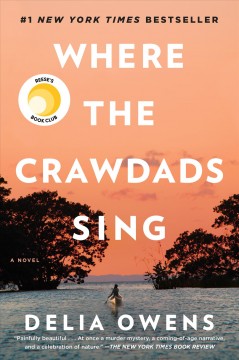According to author Delia Owens’ website, Where the Crawdads Sing (2018) spent two and a half years on the New York Times Best Sellers’ List, was number one on the list for more than a year, and will soon be a major motion picture.[i] Even today, our library district owns 32 copies of the hardback book and 22 are checked out! We own 11 e-book copies and 69 people are on hold to read as they become available. People have been mentioning it to me for years and I was excited to have enough copies to select it for our book club.
Reading it now, though, as opposed to three years ago, is bound to be a different experience. How are we influenced by time and hype and expectation? The discussion in general was easy but not gushing. Our first responder had read the book previously, loved it, and enjoyed it even more the second time. Our next quoted not observations of the marsh but of the natural human world – “But these hurried groping hands were only a taking, not a sharing or giving.”[ii] I was surprised that even among those of us who enjoyed the book, the descriptions and language so often mentioned to me at the library were not our focus. We focused on plot and character details. Kya seemed too sweet. What was Chase’s interest in Kya? How could she really survive all alone in the world? We were glad that there was not the expected backlash against Kya’s escape from justice, perhaps because of the town’s guilt for abandoning her. Why hadn’t her grandparents looked for her?
We had one kindergarten teacher and two retired teachers in our midst, so we discussed the current education system. How could the school have placed Kya in second grade and asked her to read on her first day in school. Even today (maybe even especially today) students don’t go to school and those who do bully other kids. What can we really do? One of us emphasized how we bring our own experiences to what we read. He shared how he came to the United States from Mexico and was put in third grade. He could not speak English. He was bullied and he hit back, only to be taken to the principal’s office, unable to defend himself because he couldn’t communicate.
We wondered about the difference between the urban and rural settings. The storyline started in 1952 in North Carolina. I have since looked up the 1950 population of Clark County to help with our comparison: 48,289.[iii] I read a comment from an absent member, a marine biologist, who wrote: “One thing I don’t think this book mentioned about the marsh is the smell; it’s often full of the rotten egg sulfur smell and I imagine that can’t quite be captured in words, especially if the author was trying to paint the marsh in an almost idyllic light.”[iv] I recommended an interesting perspective in the review, “Where the Crawdads Sing – are the rural poor noble savages?” [v]
Only one of us had been surprised to find that Kya was the murderer and we had some fun wondering why there couldn’t have been two identical shell necklaces. How would she have been able to find the costumes and the time to commit the murder? She wouldn’t have talked with Tate about it because some things are just better left unsaid! It is an underdog story and everybody loves an underdog!
A visitor had come to hear our discussion specifically because she had been disappointed and wondered what other readers might say to give her new perspective on why it was so popular. She wanted to love it, loved the nature and poetry, but she found it long-winded and predictable. I doubt she found her answer in our meeting. Another member had been unable to stay interested and didn’t finish reading, but she joined our discussion anyway. Where the Crawdads Sing has 1,582,532 ratings on goodreads.com.[vi] We don’t usually rate our books, but we have now joined the discussion!
- OTHER WORKS DISCUSSED
- Beasts of the Southern Wild (2012) film starring Quvenzhané Wallis
- Island of the Blue Dolphins (1960) by Scott O’Dell
- The Old Gringo (1985) Carlos Fuentes
- The Old Gringo (1989) film starring Jimmy Smits, Gregory Peck, James Fonda
[i] https://www.deliaowens.com
[ii] Page 162 (according to the Kindle version of Where the Crawdads Sing)
[iii] https://lasvegassun.com/history/timeline/
[iv] Please see the comments for the entire response from KR, who was unable to attend the meeting.
[v] “Separated from nature, guilty about their excesses, the privileged transform the rural poor into ‘noble savages’, innocent and pure.” https://artsfuse.org/181345/book-review-where-the-crawdads-sing-are-the-rural-poor-noble-savages/
[vi] https://www.goodreads.com/book/show/36809135-where-the-crawdads-sing
